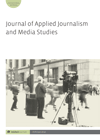
Full text loading...
 , Sedat Kökat1
, Sedat Kökat1 , Zeynep Ekin Bal1
, Zeynep Ekin Bal1
University radio broadcasting, whose first examples in Turkey date back to the 1940s, made its main leap forward with the emergence of private radio broadcasting in the early 1990s and the increase in the number of communication and broadcasting schools at different levels. Largely unable to exist legally except for a few exceptions, university radio stations have had to deal with many problems from the first examples until today. In this study, we conducted in-depth interviews with the representatives and employees of university radio stations affiliated with 34 universities in Turkey. We found that the lack of a legal basis for university radio stations causes various problems in practice. The most important of these problems include the following: first, the practices of frequency allocation and usage fees by relevant authorities are not conducted in compliance with certain standards. Financial return models are rigid and limited; the production efficiency of a radio station is interrupted when university financial support or station management is irregular or insufficient, as well. As a result, employees experience a loss of motivation in the management and content production stages.

Article metrics loading...

Full text loading...
References


Publication Date:
https://doi.org/10.1386/ajms_00060_1 Published content will be available immediately after check-out or when it is released in case of a pre-order. Please make sure to be logged in to see all available purchase options.